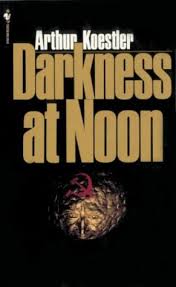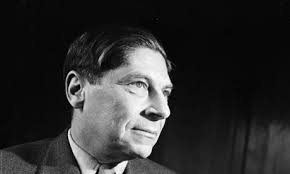Darkness at Noon by Arthur Koestler, UK, 1940
Together with Brave New World by Huxley (1932), We by Zamyatin (1920-1921) and Nineteen Eighty-Four by Orwell (1948), Darkness at Noon is one of the principaldystopian or anti-utopian novels of the twentieth century. Although some may disagree regarding the choice of novels–there are, after all, many novels that fall into that category –most would agree that all these novels highlight the danger ofdubiousutopian societies and their power to completely annihilate all values associated with normality and justice. Sometimes these societies are placed in the future; other times they are an actual part of our reality.
Koestler, a Hungarian, (born 1905, died 1983)wrote Darkness at Noonafter becomingdisillusioned withCommunism whenStalin began his purges inthe late 1930s. The book does not directly refer to the soviet regime or to Stalin (Stalin is portrayed in the book as No.1), and thestory centres on a man calledNicholas Salmanovitch Rubashov, an old Bolshevik. At the beginning of the novel, Rubashov is captured by the government’s security police and is thrown intoprison. He is not completely sure whatwill happen to him, but he suspectsthat he will probably be shot. An idealist, he hasalways believed that the utopia promised by socialism was worth the thousands, if not millions, of lives sacrificed. But, as he ruminates in prison, he is well aware that the goal is still well beyond reach. He had always been a loyal party member, yet, sitting in his isolation cell, he is no longer certain that the intimidation and cruelty he and many others have used was the right way to try to achieve the goal. Hoursof solitary confinement and severalinterrogation sessions make him realize that replacing ideals with brutality simply negatesany possibility of reaching the utopia that once may have seemed possible.
The photo of Arthur Koestler is from www.theguardian.com
In one part of the book Koestler quotes Machiavelli when he says: “Occasionally words must serve to veil the facts. But this must happen in such a way that no one becomes aware of it; or, if it should be noticed, excuses must be at hand to be produced immediately.” (p.135, paperback edition, published 1984, Bantam Books). Worth considering, perhaps, in relation not only to the anti-utopian society of Darkness at Noon but also in relation to facets of present-day society.
Darkness at Noonis actually the second book in a trilogy where the first book is The Gladiatorsand the third is Arrival and Departure.

